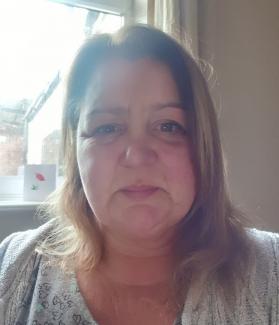Yvonne Browne, is the Improving Care Manager for Diabetes UK in the north west of England. She was diagnosed with type 1 diabetes in 1981. From the day she was first taught how to inject insulin, to today where she injects multiple times a day, insulin has been part of Yvonne’s life for 40 years.

In the lead up to finding out she had type 1 diabetes aged 15, Yvonne, from Crosby, had been showing symptoms such as increased thirst and going to the toilet frequently, which her mum suspected was diabetes.
Yvonne, 54, says: “My cousins both had type 1, so my mum knew what the symptoms were. She borrowed some test strips from my cousin to check my blood sugar and it was sky high. We went to the doctors and I was sent straight to hospital, where I was diagnosed.”
Despite being 15 years-old, Yvonne was put on an adult ward. She remembers the comments when she chatted to other patients and nurses and told them of her diagnosis.
She says: “Everything that led up to my diagnosis and straight after was like a whirlwind. I spent 10 days in hospital and was taught how to inject myself with insulin. It didn’t really sink in until the nurses on the ward kept telling me how sorry they were for me, how serious diabetes was and they were glad it wasn’t them. I remember being scared when I left hospital. All of this because my body couldn’t produce insulin.”
Yvonne came home with a bag full of testing equipment and glass syringes for injecting. She continues: “It was hard to inject yourself with the glass syringes, I used to hate having to do it, especially if I had to inject in my stomach. Thankfully it wasn’t too long before disposable syringes became available and they made a huge difference to me, although as a teenager I really felt the stigma of injecting in public.”
As a teenager she remembers how hard it was to deal with everything that was happening: “The emotional impact is huge, let alone everything you have to learn and remember. It took me a long time to understand insulin ratios and how much to take after mealtimes. I had to constantly think about food too, how many carbs I was eating and what to take to treat a hypo.”
As she got older, more and more developments were happening to support people with diabetes, which made a huge difference to everyday life.
Yvonne continues: “I got my first insulin pen in the 90’s and that was a big change. I remember how much of an impact it had on my life. It was easier to use and it made it less awkward to inject in public. I often felt self-conscious injecting in public but this was so much more discreet.”
However, new types of treatment have often brought new challenges for Yvonne too: “When I switched from using animal insulin to human insulin, it took time to transition and to understand how my body reacts to it. I lost the hypo warning signs I was used to, and understanding those signals is really important. It can be a matter of life or death.”
One thing that hasn’t changed for Yvonne is how relentless having diabetes can feel and it’s because of this that she has always wanted to help others living with the condition.
She said: “It’s strange to think that insulin and my body’s inability to make it is the reason I’ve had to live with diabetes all of these years. If you have diabetes, you deal with it because you have to but at Diabetes UK I’m doing my dream job because I get to help other people living with the condition and work to ensure that everyone has access to what they need to live well with diabetes.”
She continues: “It doesn’t have to stop you doing anything you want in life but diabetes can be really hard to cope with. Having to think about insulin all of the time, how much you need, how your body might respond to a new type of insulin you’ve been prescribed and even whether one day research advances will mean you no longer have to take insulin.
“Over the years, we’ve made some big changes happen - whether that’s getting people access to diabetes tech or making sure somebody has access to emotional support in their local area. I’m looking forward to what comes next and hopefully a world where people don’t have to live with diabetes.”
This year, 2021, marks 100 years since the discovery of insulin- a breakthrough that went on to save millions of lives worldwide. To find out more head to: 100 Years of Insulin.
